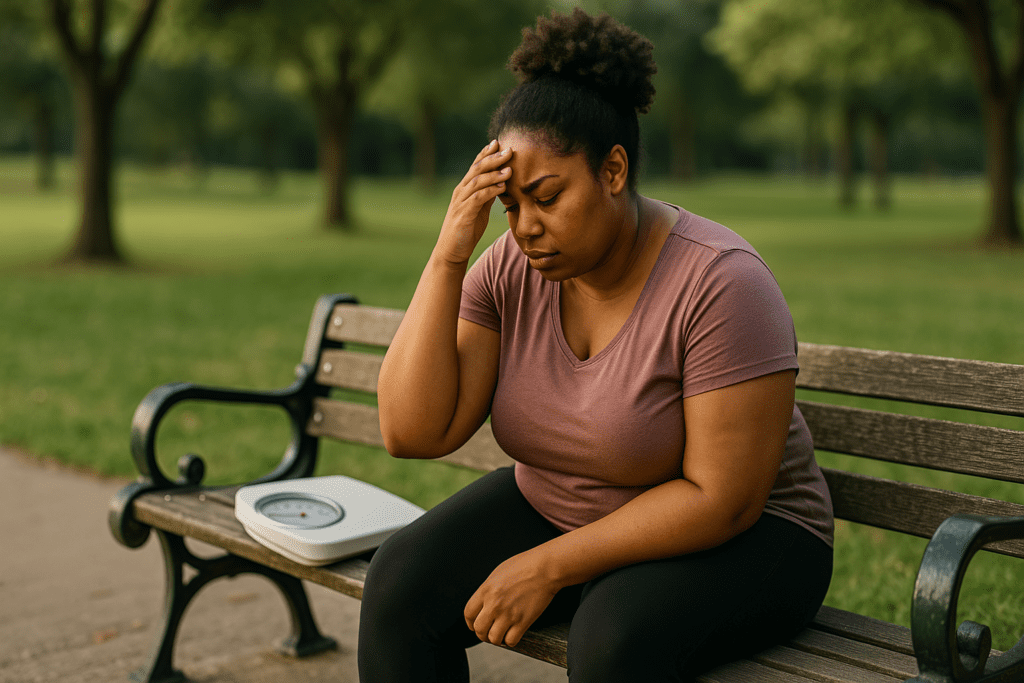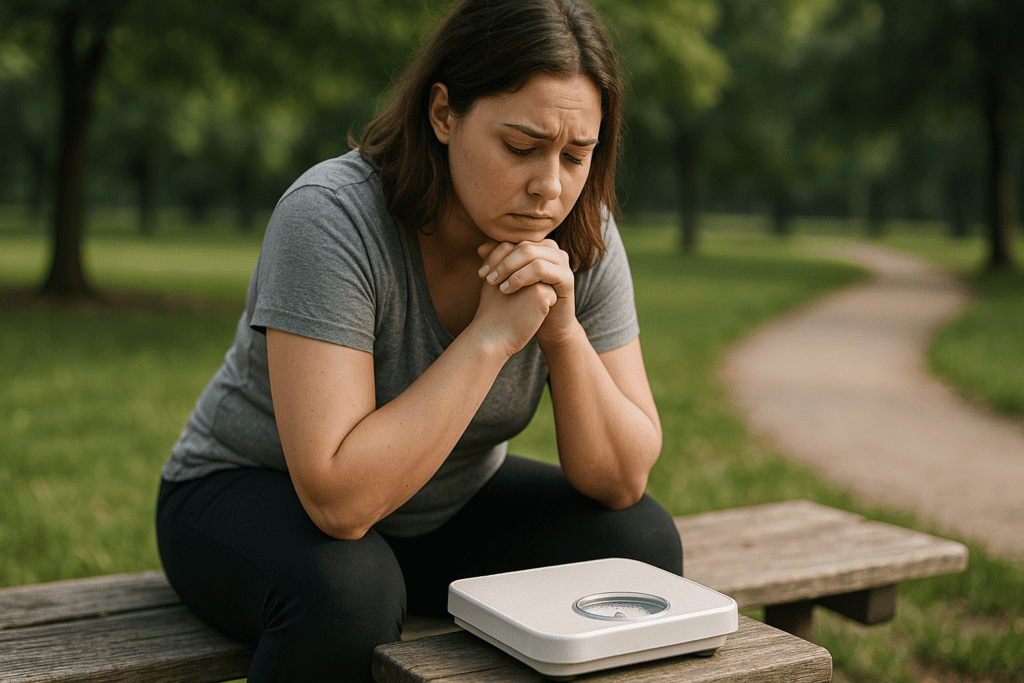The relationship between mental health and physical wellness is more intertwined than many people realize. When it comes to losing weight with anxiety, the challenges are complex and multifaceted. Weight management is not solely a matter of diet and exercise—it also involves emotional regulation, sleep quality, hormonal balance, and the ability to make consistent, conscious decisions under pressure. Anxiety, in its various forms, can undermine efforts to lose weight by disrupting appetite, metabolism, and eating behaviors. Understanding how to navigate anxiety and weight loss simultaneously is key to fostering long-term well-being and developing habits that support both mental and physical health.
You may also like: How to Stop Emotional Eating and Regain Control: Mindful Nutrition Strategies That Support a Healthier Lifestyle
Understanding the Link Between Anxiety and Weight Loss
Anxiety is often characterized by chronic stress, heightened nervous system activation, and emotional dysregulation. These physiological and psychological responses can significantly impact eating habits and body weight. Some individuals experience a loss of appetite when anxious, which can lead to unintentional weight loss and nutritional deficiencies. Others may overeat in response to anxiety as a coping mechanism, leading to weight gain and associated health concerns. The experience of anxiety and weight loss is therefore highly individualized, depending on how each person responds to stress and emotional discomfort.
Biochemically, anxiety triggers the release of stress hormones such as cortisol and adrenaline. While adrenaline can initially suppress appetite, elevated cortisol levels over time may increase cravings for calorie-dense, high-sugar foods. This hormonal fluctuation can create a paradox in which individuals alternate between periods of low appetite and intense cravings, making consistent weight management challenging. Moreover, sleep disturbances associated with anxiety can further influence hunger hormones like ghrelin and leptin, compounding the difficulty of establishing a healthy relationship with food.
Losing weight with anxiety requires more than willpower or meal planning. It calls for a nuanced understanding of the body’s stress responses and a compassionate, evidence-informed approach to dietary choices. For many, recognizing the triggers that lead to disordered eating patterns or emotional eating is the first step toward reclaiming control over one’s health. When anxiety is left unaddressed, even the most structured weight loss plan can become unsustainable or counterproductive.
How Anxiety Affects Eating Behaviors and Metabolism
The effects of anxiety on metabolism and eating patterns are profound and often overlooked in conventional weight loss discussions. For individuals experiencing chronic or generalized anxiety, the body is in a near-constant state of fight-or-flight. This sympathetic nervous system dominance can increase basal metabolic rate temporarily, potentially contributing to weight loss. However, over time, chronic anxiety can also suppress digestive function, impair nutrient absorption, and lead to gastrointestinal symptoms such as nausea, bloating, or irritable bowel syndrome (IBS).
These digestive challenges may reinforce cycles of food avoidance or restrictiveness, unintentionally reinforcing undernourishment. Conversely, the tendency to seek comfort in food can also become ingrained. Emotional eating—the practice of using food to cope with stress—is a well-documented phenomenon that can make it difficult to maintain a healthy weight. This dynamic makes losing weight with anxiety particularly challenging, as individuals may swing between extremes of restriction and overconsumption, often accompanied by guilt or shame.
Moreover, anxiety can interfere with the body’s ability to regulate blood sugar. Elevated cortisol levels can lead to insulin resistance over time, increasing the risk of developing metabolic disorders such as type 2 diabetes. Thus, addressing the psychological roots of anxiety is not only essential for mental wellness but also for supporting stable blood sugar levels, consistent energy, and long-term metabolic health. The path to successful weight management in the presence of anxiety must therefore include strategies that honor the body’s physiological responses and provide tools for emotional resilience.

Mindful Eating as a Bridge Between Mental and Physical Wellness
Mindful eating is an evidence-based practice rooted in mindfulness meditation that encourages individuals to bring present-moment awareness to the act of eating. This approach promotes a non-judgmental attitude toward food, body sensations, and hunger cues. When integrated into a routine, mindful eating can help interrupt the cycle of stress-induced eating and support those navigating anxiety and weight loss by fostering a more compassionate and intuitive relationship with food.
Rather than focusing solely on calorie counts or dietary restrictions, mindful eating emphasizes the quality of attention brought to each meal. This might include noticing the texture, flavor, and aroma of food, chewing slowly, and observing how the body responds to nourishment. For individuals losing weight with anxiety, this shift in focus can provide a sense of control and calm, reducing the compulsion to eat impulsively or skip meals entirely.
Research suggests that mindful eating can reduce binge eating episodes, decrease emotional eating, and even support modest weight loss over time. Importantly, it can also help individuals reframe food as a source of nourishment rather than a source of fear or guilt. For those living with anxiety, who often experience a heightened sensitivity to internal sensations and external stimuli, mindful eating can provide a structured yet gentle framework for reestablishing a peaceful relationship with food.
The Role of Nutrition in Managing Anxiety Symptoms
While food is not a cure for anxiety, certain dietary patterns and nutrients have been shown to influence mood and mental clarity. A balanced diet rich in whole foods—including leafy greens, whole grains, fatty fish, legumes, nuts, and seeds—can help regulate neurotransmitter production and support a more stable mood. These foods are often high in magnesium, B-vitamins, omega-3 fatty acids, and amino acids, all of which are essential for healthy brain function.
Poor nutrition, on the other hand, can exacerbate symptoms of anxiety. Diets high in refined sugars, processed foods, and caffeine may increase inflammation and disrupt neurotransmitter balance, potentially worsening anxiety symptoms. For individuals focused on losing weight with anxiety, emphasizing nutrient density over caloric restriction can help mitigate mood swings while still supporting healthy body composition goals.
Complex carbohydrates, such as oats and brown rice, can support serotonin production—a neurotransmitter that plays a key role in mood regulation. Likewise, fermented foods like yogurt and kimchi support gut health, which is increasingly recognized as a crucial player in mental wellness. The gut-brain axis, a communication network between the digestive system and the central nervous system, underscores the importance of dietary choices in managing both anxiety and weight loss.
Sleep, Stress Hormones, and Weight Management
Sleep quality is another crucial factor that ties together anxiety, weight management, and overall well-being. Sleep deprivation increases the production of ghrelin, the hunger hormone, while decreasing leptin, the satiety hormone. This hormonal imbalance can lead to increased cravings and a higher likelihood of overeating, particularly in individuals already navigating anxiety.
Anxiety often disrupts sleep patterns, making it difficult to fall asleep, stay asleep, or reach restorative sleep stages. This chronic sleep disruption can create a feedback loop, in which poor sleep worsens anxiety and weight gain, which in turn further disrupts sleep. Individuals losing weight with anxiety must therefore prioritize sleep hygiene as part of their holistic wellness strategy.
Incorporating relaxation techniques such as guided imagery, breathwork, or progressive muscle relaxation before bed can help calm the nervous system. Avoiding stimulants like caffeine late in the day and establishing a regular bedtime routine can further support restful sleep. The goal is not simply more sleep, but better quality sleep that allows the body to reset metabolically and psychologically, creating a foundation for more sustainable weight management and emotional balance.
Practical Strategies for Mindful, Stress-Aware Nutrition
Integrating mindful and stress-aware eating habits doesn’t require a complete overhaul of your lifestyle. Instead, it starts with intentional, incremental changes that promote self-awareness and compassion. One of the most effective strategies is to keep a food and mood journal. By recording what you eat and how you feel afterward, you can begin to identify patterns and triggers related to anxiety and eating behaviors.
Another helpful approach is to create a calm and distraction-free environment for meals. Eating while watching TV, scrolling on your phone, or working at your desk can prevent you from recognizing fullness cues and lead to overeating. Instead, carve out time to sit down and fully engage with your meal. This practice helps regulate portion sizes naturally and fosters a sense of satisfaction, which is particularly important for those navigating anxiety and weight loss simultaneously.
Meal prepping in advance can also reduce decision fatigue and lower anxiety around food choices. When nutritious options are readily available, it becomes easier to make consistent, health-supportive decisions without becoming overwhelmed. Focus on balance rather than perfection: include protein, fiber, and healthy fats at each meal to support blood sugar stability and emotional regulation throughout the day.

Building a Supportive Environment for Lasting Change
Creating an environment that supports both mental wellness and physical health is vital when working toward sustainable weight loss. This may involve setting healthy boundaries around social interactions, work obligations, and digital exposure that contribute to chronic stress. It might also include seeking support from a licensed therapist, registered dietitian, or health coach who understands the interplay between anxiety and eating behaviors.
Social support is especially important for individuals trying to lose weight with anxiety, as isolation can amplify negative thoughts and self-doubt. Surrounding yourself with understanding friends, joining a support group, or simply engaging in open conversations about your wellness goals can provide accountability and emotional relief. It is also helpful to reframe setbacks not as failures but as opportunities for reflection and growth.
Adjusting one’s physical space can also contribute to healthier habits. Keeping nutritious snacks visible and convenient, organizing your kitchen to reduce chaos, and even changing your workspace lighting to reduce stress can have subtle yet powerful effects. The more your environment reflects your wellness intentions, the more likely you are to stay aligned with your goals, even during periods of heightened anxiety.
Professional Guidance and When to Seek Help
While self-help strategies and lifestyle changes can make a significant difference, there are times when professional support is essential. If anxiety symptoms become overwhelming, interfere with daily functioning, or lead to disordered eating patterns, it is important to seek help from a qualified mental health provider. Cognitive-behavioral therapy (CBT), exposure therapy, and other evidence-based treatments can help reduce anxiety symptoms and support a healthier relationship with food and body image.
Similarly, registered dietitians with experience in mental health can offer personalized nutrition plans that consider both physical needs and emotional triggers. These professionals can help you avoid overly restrictive diets and instead build a plan that supports gradual, sustainable progress. When combined with regular mental health care, nutrition counseling becomes a powerful tool in managing anxiety and weight loss.
In some cases, medications may be appropriate to manage anxiety symptoms. If prescribed, it’s important to discuss potential side effects with your healthcare provider, especially those related to appetite or weight changes. Collaborating with your care team ensures that all aspects of your health—mental, physical, and nutritional—are addressed in an integrated way that promotes true, lasting wellness.

Sustaining Progress Through Self-Compassion and Resilience
One of the most powerful yet underutilized tools in achieving long-term wellness is self-compassion. Many people attempting to lose weight with anxiety are prone to harsh self-criticism and unrealistic expectations. This mindset not only undermines motivation but can increase stress and make emotional eating more likely. Practicing self-kindness, recognizing your efforts, and allowing for flexibility in your routine can improve both psychological resilience and physical outcomes.
Building resilience is about more than pushing through adversity; it’s about cultivating the capacity to adapt, reflect, and move forward with intention. This includes honoring your emotional experiences without judgment and making decisions that support your well-being even when progress feels slow. Celebrate small victories, whether that’s preparing a balanced meal, getting a full night’s sleep, or choosing a calming walk over emotional eating. These moments accumulate into meaningful, sustainable change.
Incorporating daily practices that reinforce a growth mindset can also reinforce long-term success. Journaling, affirmations, meditation, or simply checking in with your body can create an internal environment of safety and support. Over time, this internal shift enables more consistent behaviors, greater confidence, and a stronger foundation for maintaining both a healthy weight and reduced anxiety.
Frequently Asked Questions: Losing Weight with Anxiety
1. Can anxiety lead to unexplained weight loss even without dietary changes?
Yes, anxiety can result in unintentional weight loss even when eating habits remain relatively unchanged. This happens due to the body’s heightened stress response, which can alter metabolism, suppress appetite, and interfere with normal digestion. When stress hormones like cortisol and adrenaline are elevated over time, they can accelerate the breakdown of energy stores. Individuals experiencing this type of anxiety and weight loss may also report gastrointestinal discomfort, nausea, or a lack of interest in food. If persistent, this weight loss should be evaluated by a healthcare provider to rule out other underlying conditions and ensure that nutritional needs are being met.
2. How can I differentiate between emotional eating and true hunger when feeling anxious?
One of the most helpful distinctions lies in identifying the physical versus emotional cues that drive eating behavior. True hunger typically builds gradually, is accompanied by physical sensations like stomach growling, and can be satisfied with a range of foods. In contrast, emotional eating linked to anxiety often arises suddenly and is associated with cravings for specific comfort foods, especially those high in sugar or fat. For those losing weight with anxiety, keeping a log that records eating times, mood states, and physical symptoms can increase awareness of these patterns. Over time, this practice builds the self-awareness needed to respond more mindfully to emotional cues.
3. Is it possible to maintain a healthy weight while managing chronic anxiety long term?
Absolutely. While chronic anxiety poses unique challenges, it’s entirely possible to maintain a healthy weight by prioritizing emotional regulation, nutritional balance, and lifestyle routines. The key lies in developing consistent habits that support both mental and physical well-being. For people experiencing anxiety and weight loss, focusing on nutrient-rich meals eaten at regular intervals can help stabilize mood and prevent unintentional weight changes. Building a long-term routine that includes physical activity, sleep hygiene, and stress management techniques creates a foundation for sustainable health.
4. Can certain foods or nutrients help calm anxiety symptoms while supporting weight goals?
Yes, emerging evidence suggests that some nutrients may help reduce anxiety symptoms while promoting metabolic health. Foods high in magnesium, such as pumpkin seeds, spinach, and dark chocolate, may help regulate the nervous system. Omega-3 fatty acids found in fatty fish like salmon and mackerel support brain health and mood regulation. Complex carbohydrates can help balance blood sugar and enhance serotonin production, which can have a calming effect. For those losing weight with anxiety, including these foods in a well-balanced meal plan can support both emotional and physical resilience.
5. What role does physical activity play in managing anxiety-related weight fluctuations?
Physical activity has a dual role: it helps regulate stress hormones and supports weight stability. Regular movement—even light activities like walking, stretching, or yoga—can reduce cortisol levels and improve mood. Exercise also aids digestion, increases energy expenditure, and enhances sleep quality, which are often disrupted in individuals dealing with anxiety and weight loss. Importantly, exercise doesn’t need to be intense to be beneficial. Choosing enjoyable forms of movement reduces the likelihood of burnout and contributes to long-term mental and metabolic health.
6. How do social environments impact the relationship between anxiety and weight loss?
Social settings can significantly influence both eating behaviors and emotional well-being. Supportive relationships can help buffer against stress and create accountability for healthy habits. On the other hand, high-pressure environments, toxic social dynamics, or food-centric events can increase anxiety and disrupt eating patterns. For individuals focused on losing weight with anxiety, cultivating a strong, empathetic support system is essential. This may include setting boundaries, communicating needs clearly, and seeking peer or professional support in navigating social stressors.
7. Are there lesser-known strategies for supporting weight stability when dealing with anxiety?
Yes, one often overlooked approach is regulating the circadian rhythm. Maintaining consistent sleep and eating schedules can positively affect hormone balance and reduce stress sensitivity. Another helpful technique is incorporating adaptogenic herbs like ashwagandha or rhodiola under the supervision of a healthcare provider, which may modulate the stress response. Breathwork practices, such as box breathing or alternate nostril breathing, can provide quick relief from acute anxiety, helping prevent impulsive eating or digestive discomfort. These strategies can support emotional balance and reduce the risk of anxiety and weight loss becoming cyclical.
8. How can workplace stress contribute to anxiety-related weight changes?
Workplace stress is a major contributor to both chronic anxiety and weight fluctuations. High workloads, lack of autonomy, or unresolved conflict can activate the body’s stress response, leading to poor appetite, digestive issues, or reliance on convenience foods. Skipping meals, prolonged sedentary behavior, and poor sleep due to job-related anxiety can all contribute to unintentional weight loss or gain. For professionals trying to manage losing weight with anxiety, setting structured breaks, meal prepping, and practicing brief mindfulness exercises during the workday can improve both focus and health outcomes.
9. How does body image influence the experience of anxiety and weight loss?
Negative body image can amplify anxiety and create unrealistic expectations around food and weight. This psychological pressure may trigger restrictive eating or obsessive behaviors that can spiral into disordered eating patterns. For those already experiencing anxiety and weight loss, distorted body image can make it harder to recognize when further weight loss is harmful rather than helpful. Therapeutic approaches like cognitive-behavioral therapy (CBT) can help reframe body image perceptions and build a healthier self-concept. By cultivating self-acceptance, individuals are more likely to make choices that support overall well-being rather than short-term aesthetic goals.
10. What should someone do if they feel stuck in a cycle of anxiety and unintentional weight loss?
First, it’s important to acknowledge the cycle without self-judgment. Seeking support from a qualified therapist and registered dietitian can provide a safe and structured environment to unpack the emotional and nutritional factors involved. Personalized treatment may include meal planning that emphasizes consistency and nourishment, as well as therapy sessions that explore underlying stressors. For many people, interrupting the pattern of losing weight with anxiety requires addressing the root cause, whether that be perfectionism, unresolved trauma, or chronic stress. Healing is possible when both physical symptoms and emotional needs are treated with equal care and attention.
Nourishing Both Mind and Body: A Holistic Approach to Anxiety and Weight Loss
Navigating the dual journey of anxiety and weight loss requires an integrative, compassionate, and evidence-informed approach. Rather than focusing solely on physical outcomes, successful long-term change begins with understanding the emotional and physiological factors that shape eating behaviors, metabolic health, and overall well-being. Mindful eating, nutrient-rich choices, quality sleep, supportive environments, and professional guidance all play crucial roles in building a lifestyle that honors both mental clarity and physical vitality.
For those losing weight with anxiety, the key lies not in rigid discipline but in cultivating self-awareness, patience, and resilience. When food becomes a form of nourishment rather than a source of stress, and when anxiety is met with care instead of criticism, the body and mind begin to find equilibrium. Through this process, weight loss becomes not an end goal, but a natural byproduct of holistic health and emotional alignment.
By embracing mindful eating and stress-aware nutrition as part of a broader wellness journey, individuals can move beyond the cycle of deprivation and distress. Instead, they can build a sustainable path toward health that uplifts both body and spirit, offering not just temporary change but lifelong transformation.
stress and metabolism, emotional eating habits, cortisol and weight gain, mindful nutrition tips, mental health and diet, holistic weight management, gut-brain connection, healthy eating habits, managing stress naturally, intuitive eating practices, sleep and hormone balance, mood-supporting foods, digestive health and anxiety, calming daily routines, blood sugar and mood, balanced lifestyle changes, healthy relationship with food, nutritional therapy for anxiety, self-compassion and wellness, sustainable weight goals
Further Reading:
Mindful Eating: The Art of Presence While You Eat
Mindful Eating 101 — A Beginner’s Guide
Mindful eating may help with weight loss
Disclaimer
The information contained in this article is provided for general informational purposes only and is not intended to serve as medical, legal, or professional advice. While NewsHealthWatch strives to present accurate, up-to-date, and reliable content, no warranty or guarantee, expressed or implied, is made regarding the completeness, accuracy, or adequacy of the information provided. Readers are strongly advised to seek the guidance of a qualified healthcare provider or other relevant professionals before acting on any information contained in this article. NewsHealthWatch, its authors, editors, and contributors expressly disclaim any liability for any damages, losses, or consequences arising directly or indirectly from the use, interpretation, or reliance on any information presented herein. The views and opinions expressed in this article are those of the author(s) and do not necessarily reflect the official policies or positions of NewsHealthWatch.

